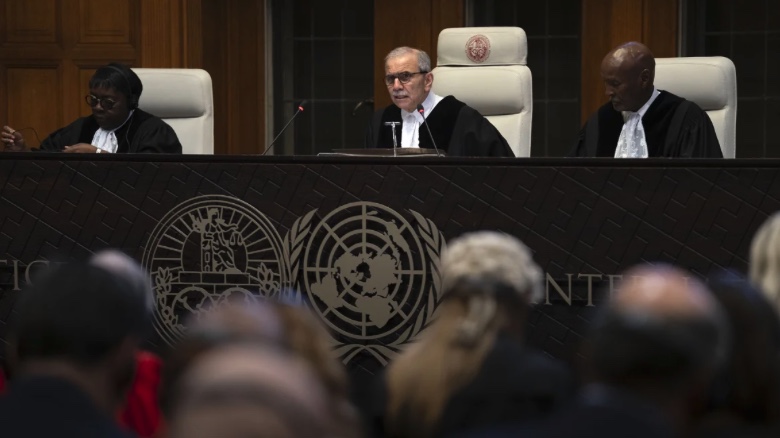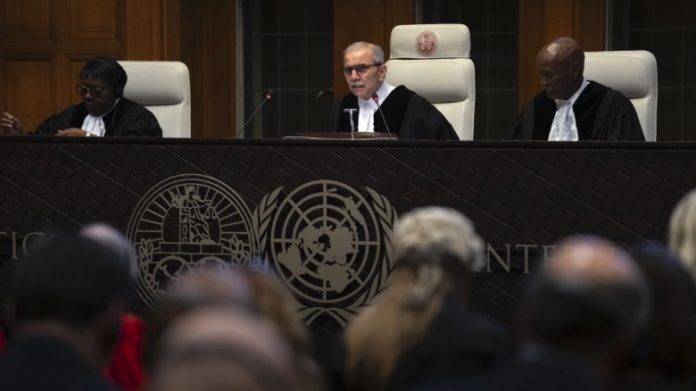ศาลยุติธรรมระหว่างประเทศ International Court of Justice (ICJ) สั่งให้อิสราเอลยุติปฏิบัติการทางทหารในเมืองราฟาห์ ฉนวนกาซาทันที ผู้พิพากษา Nawaf Salam ประธาน ICJ ระบุว่าอิสราเอลต้องยุติการรุกเพื่อป้องกันเงื่อนไขที่อาจนำไปสู่การทำลายล้างกลุ่มชาวปาเลสไตน์ในฉนวนกาซา ศาลมองว่าสถานการณ์ด้านมนุษยธรรมในราฟาห์เป็น “หายนะ” โดยเจ้าหน้าที่สหประชาชาติเตือนถึงความรุนแรงยิ่งขึ้น หากปฏิบัติการของอิสราเอลยังคงมีอยู่ อิสราเอลเปิดฉากรุกภาคพื้นดินอย่างจำกัดในเมืองราฟาห์เมื่อวันที่ 7 พฤษภาคม ขัดขวางการโทรระหว่างประเทศ รวมทั้งจากสหรัฐอเมริกา ให้ยุติลง ก่อนปฏิบัติการดังกล่าว ชาวปาเลสไตน์กว่าล้านคนหาที่พักพิงในเมืองราฟาห์ แต่หลังจากนั้นมีผู้พลัดถิ่นประมาณ 800,000 คน เมื่อเข้าไปในเมืองราฟาห์ กองทัพได้ยึดจุดผ่านแดนของเมืองกับอียิปต์ได้ ซึ่งจำเป็นสำหรับความช่วยเหลือด้านมนุษยธรรม ซึ่งยังคงปิดอยู่
ศาลสั่งให้อิสราเอลเปิดทางข้ามราฟาห์เพื่อขอความช่วยเหลือด้านมนุษยธรรม โดยอ้างว่ามาตรการอพยพไม่เพียงพอ อย่างไรก็ตาม ICJ ขาดกลไกการบังคับใช้ และคำตัดสินในอดีตก็ถูกเพิกเฉย เจ้าหน้าที่อิสราเอลวิพากษ์วิจารณ์การตัดสินใจดังกล่าว ในขณะที่กลุ่มฮามาสยินดี แต่แสดงความผิดหวังที่การตัดสินใจนี้มีผลกับราฟาห์เท่านั้น แอฟริกาใต้ได้ยื่นคำร้องเร่งด่วนเพื่อดำเนินการต่อไปกับอิสราเอล โดยกล่าวหาว่าอิสราเอลเป็นอันตรายต่อพลเรือนในราฟาห์ โดยเป็นส่วนหนึ่งของคดีใหญ่ที่กล่าวหาว่ามีการฆ่าล้างเผ่าพันธุ์ชาวปาเลสไตน์ Gilad Noam รองอัยการสูงสุดด้านกฎหมายระหว่างประเทศของอิสราเอลปฏิเสธข้อกล่าวหาที่ ICJ และเรียกร้องให้ศาลพิจารณาสถานการณ์ของอิสราเอล
สภาความมั่นคงแห่งชาติของอิสราเอลและกระทรวงการต่างประเทศระบุว่าพวกเขาจะไม่มีส่วนร่วมในกิจกรรมทางทหารในราฟาห์ซึ่งเสี่ยงต่อการถูกทำลายล้างของพลเรือนชาวปาเลสไตน์ พวกเขายืนยันถึงความพยายามในการให้ความช่วยเหลือด้านมนุษยธรรมในฉนวนกาซาและลดอันตรายให้เหลือน้อยที่สุด ศาสตราจารย์ Eliav Lieblich กล่าวถึงความคลุมเครือในคำตัดสิน แต่เน้นย้ำถึงความกังวลของศาลเกี่ยวกับความเสี่ยงในการดำเนินการต่อสิทธิที่ได้รับการคุ้มครอง เขาแสดงความไม่แน่ใจเกี่ยวกับการปฏิบัติตามข้อกำหนดของอิสราเอล ท่ามกลางแรงกดดันที่เพิ่มขึ้นเพื่อยุติความขัดแย้งในฉนวนกาซา อัยการ ICC ขอหมายจับผู้นำกลุ่มฮามาสและเจ้าหน้าที่อิสราเอล รวมถึงนายกรัฐมนตรีเบนจามิน เนทันยาฮู และรัฐมนตรีกลาโหม ยูอาฟ กัลลันต์ ในข้อหาก่ออาชญากรรมสงครามและก่ออาชญากรรมต่อมนุษยชาติ
Yossi Mekelberg จาก Chatham House ในลอนดอนมองว่าแรงกดดันจากนานาชาติต่ออิสราเอลอย่างที่ไม่เคยเกิดขึ้นมาก่อน เนื่องจากลักษณะของความขัดแย้งและพฤติกรรมของอิสราเอล นีฟ กอร์ดอน ศาสตราจารย์ด้านกฎหมายสิทธิมนุษยชนที่มหาวิทยาลัยควีนแมรีแห่งลอนดอน เชื่อว่าคำตัดสินดังกล่าวอาจบ่อนทำลายระบบตุลาการของอิสราเอล เพื่อตอบสนองต่อคำตัดสินของ ICC อัยการสูงสุดของอิสราเอล Gali Baharav-Miara และอัยการสูงสุดแห่งรัฐ Amit Aisman ได้แสดงความเชื่อมั่นในกองทัพ และยืนยันความสามารถของฝ่ายตุลาการในการจัดการคดีดังกล่าว ตามรายงานของ Times of Israel
The United Nations’ highest court has ordered Israel to cease its operation in Rafah “immediately.”

The International Court of Justice (ICJ) has ordered Israel to immediately cease its military operation in Rafah, Gaza. Judge Nawaf Salam, president of the ICJ, stated that Israel must halt its offensive to prevent conditions that could lead to the destruction of Palestinian groups in Gaza. The court deems the humanitarian situation in Rafah as “disastrous,” with UN officials warning of further intensification if the Israeli operation persists. Israel launched a limited ground offensive in Rafah on May 7, defying international calls, including from the United States, to halt. Before the operation, over a million Palestinians sought shelter in Rafah, but around 800,000 have been displaced since. Upon entering Rafah, the military seized the city’s border crossing with Egypt, crucial for humanitarian aid, which remains closed.
The court ordered Israel to open the Rafah crossing for humanitarian aid, citing inadequate evacuation measures. However, the ICJ lacks enforcement mechanisms, and past rulings have been ignored. Israeli officials criticised the decision, while Hamas welcomed it but expressed disappointment that it only applied to Rafah. South Africa filed an urgent request for further action against Israel, accusing it of endangering civilians in Rafah, as part of a larger case alleging genocide against Palestinians. Israel’s Deputy Attorney General for International Law Gilad Noam rejected the allegations at the ICJ and urged the court to consider Israel’s circumstances.
Israel’s National Security Council and Ministry of Foreign Affairs stated that they won’t engage in military activities in Rafah risking Palestinian civilians’ destruction. They affirmed efforts to allow humanitarian aid into Gaza and minimise harm. Professor Eliav Lieblich noted ambiguity in the ruling but highlighted the court’s concern about the operation’s risk to protected rights. He expressed uncertainty about Israel’s compliance. Amid mounting pressure to end the Gaza conflict, the ICC prosecutor seeks arrest warrants for Hamas leaders and Israeli officials, including Prime Minister Benjamin Netanyahu and Defense Minister Yoav Gallant, for alleged war crimes and crimes against humanity.
Yossi Mekelberg of Chatham House in London views the international pressure on Israel as unprecedented due to the nature of the conflict and Israel’s conduct. Neve Gordon, a human rights law professor at Queen Mary University of London, believes the ruling could undermine Israel’s judiciary. Responding to the ICC’s decision, Israel’s Attorney General Gali Baharav-Miara and State Attorney Amit Aisman expressed confidence in the military and affirmed the judiciary’s capacity to handle such cases, according to the Times of Israel.
By CNN NEWS

















